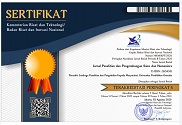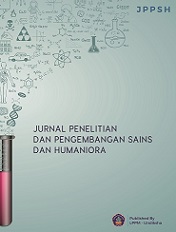The Smartphone Uses and Dependency Toward Emotional Intelligence on Generation Z
DOI:
https://doi.org/10.23887/jppsh.v5i1.34616Keywords:
Smartphone Use, Smartphone Dependency, Emotional Intelligence, Generation ZAbstract
Advances in smartphone technology can now help workers in almost everything, from aspects of communication, entertainment, education, and so on. In some cases, while in the office workers usually use their smartphone to relieve their work stress during working hours. This study aims to analyze the effect of smartphone use and dependence on workers' emotional intelligence. This research is a quantitative research using the correlation analysis technique. The population in this study is Generation Z who are already working. Sampling was done by using the purposive sampling technique, to obtain a sample of 106 respondents. Data was collected using an instrument in the form of a questionnaire. The data that has been collected is then analyzed using multiple regressions. The findings show that the regression equation for this study is Y = 0.043 – 0.07058(X1) + 0.883(X2) + e. Based on these equations, it can be concluded that the use of smartphone has a negative effect on the emotional intelligence of workers, while dependence on smartphone has a positive effect on the emotional intelligence of workers.
References
Barkhuus, L., & Polichar, V. E. (2011). Empowerment Through Seamfulness : Smart Phones In Everyday Life. 629–639. https://doi.org/10.1007/s00779-010-0342-4.
Binnford, T. (2017). Personal Phones Pausing a Problem at Work? Damage Control is Possible. HR Hero Line. https://hrdailyadvisor.blr.com/2017/05/19/personal-phones-causing-a-problem-at-work-damage-control-is-possible/.
Che, D., Hu, J., Zhen, S., Yu, C., Li, B., Chang, X., & Brand, S. (2017). Dimensions of Emotional Intelligence and Online Gaming Addiction in Adolescence : The Indirect Effects of Two Facets of Perceived Stress. 8(July), 1–8. https://doi.org/10.3389/fpsyg.2017.01206.
Cheung, F. Y. lok, & Tang, C. S. kum. (2009). The Influence of Emotional Intelligence and Affectivity on Emotional Labor Strategies at Work. Journal of Individual Differences, 30(2), 75–86. https://doi.org/10.1027/1614-0001.30.2.75.
Cho, K., & Lee, J. (2017). Computers in Human Behavior Influence of Smartphone Addiction Proneness of Young Children On Problematic Behaviors and Emotional Intelligence : Mediating Self-Assessment Effects of Parents Using Smartphones. Computers in Human Behavior, 66, 303–311. https://doi.org/10.1016/j.chb.2016.09.063.
Databoks. (2019). Penetrasi Smartphone Terhadap jumlah Penduduk Indonesia. Databoks. https://databoks.katadata.co.id/datapublish/2019/07/05/penetrasi-smartphone-terhadap-jumlah-penduduk-indonesia.
Deursen, A. J. A. M. Van, Bolle, C. L., Hegner, S. M., & Kommers, P. A. M. (2015). Computers in Human Behavior Modeling Habitual and Addictive Smartphone Behavior The Role of Smartphone Usage Types , Emotional Intelligence , Social Stress , Self-Regulation , Age , and Gender. Computers in Human Behavior, 45, 411–420. https://doi.org/10.1016/j.chb.2014.12.039.
Dimock, M. (2019). Defining Generations : Where Millenials End and Generation Z Begins. Pew Research Center. https://www.pewresearch.org/fact-tank/2019/01/17/where-millennials-end-and-generation-z-begins/.
Duke, É., & Montag, C. (2017). Smartphone Addiction, Daily Interruptions and Self-Reported Productivity. Addictive Behaviors Reports, 6, 90–95. https://doi.org/10.1016/j.abrep.2017.07.002.
Furnham, A. (2009). The Importance and Training of Emotional Intelligence at Work. The Springer Series on Human Exceptionality, 103–117. https://doi.org/10.1007/978-0-387-88370-0.
Lanaj, K., Johnson, R. E., & Barnes, C. M. (2014). Organizational Behavior and Human Decision Processes Beginning The Workday Yet Already Depleted ? Consequences of Late-Night Smartphone Use and Sleep. Organizational Behavior and Human Decision Processes, 124(1), 11–23. https://doi.org/10.1016/j.obhdp.2014.01.001.
Lee, K. E. (2016). Dependency on Smartphone Use and Its Association with Anxiety in Korea. 131(June).
Li, L., & Lin, T. T. C. (2019). Smartphones at Work : A Qualitative Exploration of Psychological Antecedents and Impacts of Work-Related Smartphone Dependency. 18, 1–12. https://doi.org/10.1177/1609406918822240.
Littlejohn, P. (2012). The Missing Link : Using Emotional Intelligence to Reduce Workplace Stres and Workplace Violence in Our Nursing and Other Health Care Proffesions. Journal of Professional Nursing, 28(6), 360–368. https://doi.org/10.1016/j.profnurs.2012.04.006.
Mayer, J. D., Salovey, P., & Caruso, D. R. (2008). Emotional Intelligence: New Ability or Eclectic Traits? American Psychologist, 63(6), 503–517. https://doi.org/10.1037/0003-066X.63.6.503.
Montag, C., & Walla, P. (2016). Carpe Diem Instead of Losing Your Social Mind : Beyond Digital Addiction and Why We All Suffer from Digital Overuse. Cogent Psychology. https://doi.org/10.1080/23311908.2016.1157281.
Oktan, V. (2011). The Predictive Relationship Between Emotion Management Skills and Internet Addiction. Social Behavior and Personality, 39(10), 341–388. https://doi.org/10.1201/b18230
Oulasvirta, A., Rattenbury, T., Ma, L., & Raita, E. (2012). Habits Make Smartphone Use More Pervasive. Personal and Ubiquitous Computing, 16(1), 105–114. https://doi.org/10.1007/s00779-011-0412-2.
Park, N., Kim, Y., Young, H., & Shim, H. (2013). Computers in Human Behavior Factors Influencing Smartphone Use and Dependency in South Korea. Computers in Human Behavior, 29(4), 1763–1770. https://doi.org/10.1016/j.chb.2013.02.008.
Rizkia, C. (2019). Apa Saja Aktivitas Favorit Pengguna Smartphone di Idonesia. Technologue.Id. https://technologue.id/apa-saja-aktivitas-favorit-pengguna-smartphone-di-indonesia/amp/
Schutte, N. S., & Loi, N. M. (2014). Connections Between Emotional Intelligence and Workplace Flourishing. Personality and Individual Differences, 66, 134–139. https://doi.org/10.1016/j.paid.2014.03.031.
Septania, R. C. (2018). Lebih dari Separuh Generasi Z Kecanduan Ponsel. https://tekno.kompas.com/read/2018/02/24/15094817/lebih-dari-separuh-generasi-z-kecanduan-ponsel.
Siew, S. C., Gan, P. L., & Ramayah, T. (2017). .A Review of The Theories In Cyberloafing Studies. Advanced Science Letters, 23(9), 9174–9176. https://doi.org/10.1166/asl.2017.10049.
Sun, J., Liu, Q., Yu, S., Liu, Q., & Yu, S. (2018). Child Neglect, Psychological Abuse and Smartphone Addiction Among Chinese Adolescents: The Roles of EmotionalIntelligence and Coping Style. https://doi.org/10.1016/j.chb.2018.08.032.
Thomée, S., Härenstam, A., & Hagberg, M. (2011). Mobile Phone Use and Stress, Sleep Disturbances, and Symptoms of Depression Among Young Adults - A Prospective Cohort Study. BMC Public Health, 11. https://doi.org/10.1186/1471-2458-11-66.
Walsh, S. P., White, K. M., Young, R. M., Walsh, S. P., White, K. M., Mcd, R., Needing, Y., Walsh, S. P., White, K. M., & Young, R. M. (2010). Needing to Connect : The Effect of Self And Others On Young People’s Involvement With Their Mobile Phones Involvement With Their Mobile Phones. 9530(December). https://doi.org/10.1080/00049530903567229.
Zhitomirsky-geffet, M., & Blau, M. (2016). Computers in Human Behavior Cross-Generational Analysis of Predictive Factors of Addictive Behavior in Smartphone Usage. Computers in Human Behavior, 64, 682–693. https://doi.org/10.1016/j.chb.2016.07.061.
Downloads
Published
Issue
Section
License
Authors who publish with the Jurnal Penelitian dan Pengembangan Sains dan Humaniora agree to the following terms:
- Authors retain copyright and grant the journal the right of first publication with the work simultaneously licensed under a Creative Commons Attribution License (CC BY-SA 4.0) that allows others to share the work with an acknowledgment of the work's authorship and initial publication in this journal.
- Authors are able to enter into separate, additional contractual arrangements for the non-exclusive distribution of the journal's published version of the work (e.g., post it to an institutional repository or publish it in a book), with an acknowledgment of its initial publication in this journal.
- Authors are permitted and encouraged to post their work online (e.g., in institutional repositories or on their website) prior to and during the submission process, as it can lead to productive exchanges, as well as earlier and greater citation of published work. (See The Effect of Open Access)









